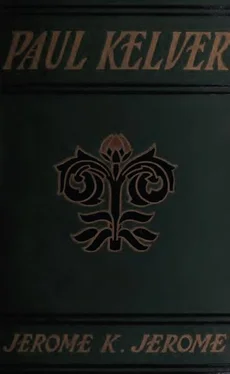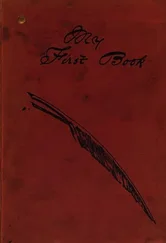Jerome Jerome - Paul Kelver
Здесь есть возможность читать онлайн «Jerome Jerome - Paul Kelver» весь текст электронной книги совершенно бесплатно (целиком полную версию без сокращений). В некоторых случаях можно слушать аудио, скачать через торрент в формате fb2 и присутствует краткое содержание. Город: New York, Год выпуска: 1902, Издательство: Dodd, Mead & Company, Жанр: Классическая проза, на английском языке. Описание произведения, (предисловие) а так же отзывы посетителей доступны на портале библиотеки ЛибКат.
- Название:Paul Kelver
- Автор:
- Издательство:Dodd, Mead & Company
- Жанр:
- Год:1902
- Город:New York
- ISBN:нет данных
- Рейтинг книги:3 / 5. Голосов: 1
-
Избранное:Добавить в избранное
- Отзывы:
-
Ваша оценка:
- 60
- 1
- 2
- 3
- 4
- 5
Paul Kelver: краткое содержание, описание и аннотация
Предлагаем к чтению аннотацию, описание, краткое содержание или предисловие (зависит от того, что написал сам автор книги «Paul Kelver»). Если вы не нашли необходимую информацию о книге — напишите в комментариях, мы постараемся отыскать её.
Paul Kelver — читать онлайн бесплатно полную книгу (весь текст) целиком
Ниже представлен текст книги, разбитый по страницам. Система сохранения места последней прочитанной страницы, позволяет с удобством читать онлайн бесплатно книгу «Paul Kelver», без необходимости каждый раз заново искать на чём Вы остановились. Поставьте закладку, и сможете в любой момент перейти на страницу, на которой закончили чтение.
Интервал:
Закладка:
“I think, my dear,” my aunt would direct, “we'll have him stuffed with chestnuts and served on toast. And don't forget the giblets. They make such excellent sauce.”
With regard to the diet of imprisoned maidens she would advise:
“Not too much fish—it spoils the flesh for roasting.”
The things that she would turn people into—king's sons, rightful princesses, such sort of people—people who after a time, one would think, must have quite forgotten what they started as. To let her have her way was a lesson to me in natural history both present and pre-historic. The most beautiful damsel that ever lived she would without a moment's hesitation turn into a Glyptodon or a Hippocrepian. Afterwards, when I could guess at the spelling, I would look these creatures up in the illustrated dictionary, and feel that under no circumstances could I have loved the lady ever again. Warriors and kings she would delight in transforming into plaice or prawns, and haughty queens into Brussels sprouts.
With gusto would she plan a complicated slaughter, paying heed to every detail: the sharpening of the knives, the having ready of mops and pails of water for purposes of after cleaning up. As a writer she would have followed the realistic school.
Her death, with which we invariably wound up the afternoon, was another conscientious effort. Indeed, her groans and writhings would sometimes frighten me. I always welcomed the last gurgle. That finished, but not a moment before, my aunt would let down her skirt—in this way suggesting the fall of the curtain upon our play—and set to work to get the tea.
Another frequently recurring picture that I see is of myself in glazed-peaked cap explaining many things the while we walk through dingy streets to yet a smaller figure curly haired and open eyed. Still every now and then she runs ahead to turn and look admiringly into my face as on the day she first became captive to the praise and fame of me.
I was glad of her company for more reasons than she knew of. For one, she protected me against my baser self. With her beside me I should not have dared to flee from sudden foes. Indeed, together we courted adventure; for once you get used to it this standing hazard of attack adds a charm to outdoor exercise that older folk in districts better policed enjoy not. So possibly my dog feels when together we take the air. To me it is a simple walk, maybe a little tiresome, suggested rather by contemplation of my waistband than by desire for walking for mere walking's sake; to him an expedition full of danger and surprises: “The gentleman asleep with one eye open on The Chequer's doorstep! will he greet me with a friendly sniff or try to bite my head off? This cross-eyed, lop-eared loafer, lurching against the lamp-post! shall we pass with a careless wag and a 'how-do,' or become locked in a life and death struggle? Impossible to say. This coming corner, now, 'Ware! Is anybody waiting round there to kill me, or not?”
But the trusting face beside me nerved me. As reward in lonely places I would let her hold my hand.
A second advantage I derived from her company was that of being less trampled on, less walked over, less swept aside into doorway or gutter than when alone. A pretty, winsome face had this little maid, if Memory plays me not kindly false; but also she had a vocabulary; and when the blind idiot, male or female, instead of passing us by walking round us, would, after the custom of the blind idiot, seek to gain the other side of us by walking through us, she would use it.
“Now, then, where yer coming to, old glass-eye? We ain't sperrits. Can't yer see us?”
And if they attempted reply, her child's treble, so strangely at variance with her dainty appearance, would only rise more shrill.
“Garn! They'd run out of 'eads when they was making you. That's only a turnip wot you've got stuck on top of yer!” I offer but specimens.
Nor was it of the slightest use attempting personal chastisement, as sometimes an irate lady or gentleman would be foolish enough to do. As well might an hippopotamus attempt to reprove a terrier. The only result was to provide comedy for the entire street.
On these occasions our positions were reversed, I being the admiring spectator of her prowess. Yet to me she was ever meek, almost irritatingly submissive. She found out where I lived and would often come and wait for me for hours, her little face pressed tight against the iron railings, until either I came out or shook my head at her from my bedroom window, when she would run off, the dying away into silence of her pattering feet leaving me a little sad.
I think I cared for her in a way, yet she never entered into my day-dreams, which means that she existed for me only in the outer world of shadows that lay round about me and was not of my real life.
Also, I think she was unwise, introducing me to the shop, for children and dogs—one seems unconsciously to bracket them in one's thoughts—are snobbish little wretches. If only her father had been a dealer in firewood I could have soothed myself by imagining mistakes. It was a common occurrence, as I well knew, for children of quite the best families to be brought up by wood choppers. Fairies, the best intentioned in the world, but born muddlers, were generally responsible for these mishaps, which, however, always became righted in time for the wedding. Or even had he been a pork butcher, and there were many in the neighbourhood, I could have thought of him as a swineherd, and so found precedent for hope.
But a fishmonger—from six in the evening a fried fishmonger! I searched history in vain. Fried fishmongers were without the pale.
So gradually our meetings became less frequent, though I knew that every afternoon she waited in the quiet Stainsby Road, where dwelt in semi-detached, six-roomed villas the aristocracy of Poplar, and that after awhile, for arriving late at times I have been witness to the sad fact, tears would trace pathetic patterns upon her dust-besprinkled cheeks; and with the advent of the world-illuminating Barbara, to which event I am drawing near, they ceased altogether.
So began and ended my first romance. One of these days—some quiet summer's afternoon, when even the air of Pigott Street vibrates with tenderness beneath the whispered sighs of Memory, I shall walk into the little grocer's shop and boldly ask to see her. So far have I already gone as to trace her, and often have I tried to catch sight of her through the glass door, but hitherto in vain. I know she is the more or less troubled mother of a numerous progeny. I am told she has grown stout, and probable enough it is that her tongue has gained rather than lost in sharpness. Yet under all the unrealities the clumsy-handed world has built about her, I shall see, I know, the lithesome little maid with fond, admiring eyes. What help they were to me I never knew till I had lost them. How hard to gain such eyes I have learned since. Were we to write the truth in our confession books, should we not admit the quality we most admire in others is admiration of ourselves? And is it not a wise selection? If you would have me admirable, my friend, admire me, and speak your commendation without stint that in the sunshine of your praises I may wax. For indifference maketh an indifferent man, and contempt a contemptible man. Come, is it not true? Does not all that is worthy in us grow best by honour?
Chief among the remaining figures on my childhood's stage were the many servants of our house, the “generals,” as they were termed. So rapid, as a rule, was their transit through our kitchen that only one or two, conspicuous by reason of their lingering, remain upon my view. It was a neighbourhood in which domestic servants were not much required. Those intending to take up the calling seriously went westward. The local ranks were recruited mainly from the discontented or the disappointed, from those who, unappreciated at home, hoped from the stranger more discernment; or from the love-lorn, the jilted and the jealous, who took the cap and apron as in an earlier age their like would have taken the veil. Maybe, to the comparative seclusion of our basement, as contrasted with the alternative frivolity of shop or factory, they felt in such mood more attuned. With the advent of the new or the recovery of the old young man they would plunge again into the vain world, leaving my poor mother to search afresh amid the legions of the cursed.
Читать дальшеИнтервал:
Закладка:
Похожие книги на «Paul Kelver»
Представляем Вашему вниманию похожие книги на «Paul Kelver» списком для выбора. Мы отобрали схожую по названию и смыслу литературу в надежде предоставить читателям больше вариантов отыскать новые, интересные, ещё непрочитанные произведения.
Обсуждение, отзывы о книге «Paul Kelver» и просто собственные мнения читателей. Оставьте ваши комментарии, напишите, что Вы думаете о произведении, его смысле или главных героях. Укажите что конкретно понравилось, а что нет, и почему Вы так считаете.












